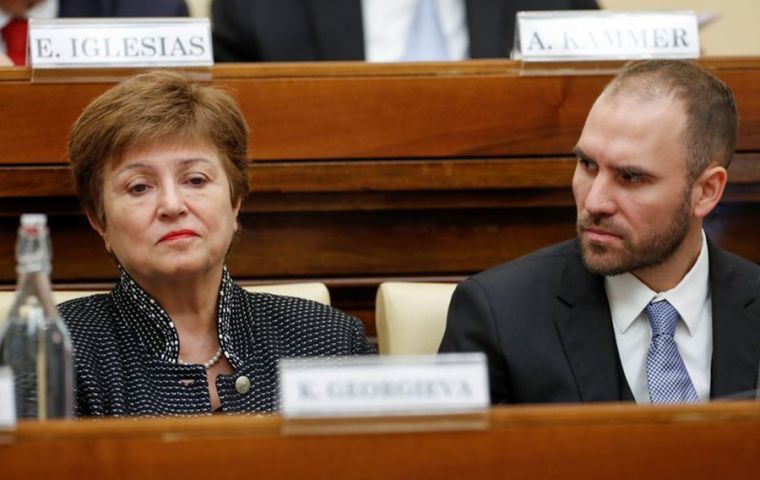MercoPress. South Atlantic News Agency
IMF mission begins talks in Argentina; Government presented his fiscal plan to Congress
 Minister Guzman, along with Georgieva in the photo, presented his plan to Congress on Wednesday, lamenting that “the country faces a debt burden preventing it from avoiding a recession spiral.”
Minister Guzman, along with Georgieva in the photo, presented his plan to Congress on Wednesday, lamenting that “the country faces a debt burden preventing it from avoiding a recession spiral.”  Fernandez insists Argentina cannot meet debt payments without economic growth, but the country's inflation rate is more than 50%, one of the world's highest
Fernandez insists Argentina cannot meet debt payments without economic growth, but the country's inflation rate is more than 50%, one of the world's highest Recession-hit Argentina opened talks on Wednesday with a team from the IMF, seeking relief from what President Alberto Fernandez says is an unsustainable foreign debt. The delegation, led by Julie Kozack and Luis Cubeddu, arrived in Buenos Aires for a week-long visit as left-wing groups staged public protests to demand a suspension of debt payments.
The government hopes to renegotiate US$ 195 billion of its US$ 311 billion foreign debt, including a deeply unpopular US$ 44 billion bailout loan from the Washington-based International Monetary Fund in 2018.
Argentina's crisis was sparked by a sudden crash in the Peso's value more than 18 months ago, a fall that continued last year. The country became a market pariah after defaulting in 2001 on US$ 100 billion in debt, something the Peronist Fernandez wants to avoid repeating.
The aim of the IMF mission to Latin America's third-biggest economy is to “continue the ongoing dialogue regarding the Argentine government's economic program and the country's economic perspectives,” an IMF spokesperson in Washington said.
“The mission will also be an opportunity to learn more about the authorities' strategy to approach Argentina's debt situation.”
Fernandez insists Argentina cannot meet debt payments without economic growth, but the country's inflation rate is more than 50%, one of the world's highest, and there is mounting poverty and joblessness.
Economy Minister Martin Guzman presented his fiscal plan to Congress on Wednesday, lamenting that “the country faces a debt burden preventing it from avoiding a recession spiral.”
The risk evaluation company Verisk Maplecroft said that ”despite its statements that it wants to pay (its debt), so far the government has lacked clarity around key political decisions.“
Both sides, the IMF and the government, have spoken positively about their exchanges.
”The change in leadership at the IMF has been refreshing in a certain way. Even though there is not yet a way forward, there is a growing mutual understanding,“ Guzman said before Congress, alluding to new IMF head Kristalina Georgieva.
”The IMF is showing a willingness because it wants to get paid and also in part because it contributed to this situation,“ economist Hector Rubini from Salvador University said, referring to the original bailout loan agreed with former president Mauricio Macri for a record US$ 57 billion.
When assuming power two months ago, Fernandez refused the additional US$13 billion in disbursements, bringing the total loan to US$44 billion.
Guzman questioned whether the loan's sustainability was considered before it was granted, saying both Argentina and the IMF bear ”responsibility“ for the current situation.
About 6,000 people demonstrated in front of Congress in Buenos Aires on Wednesday, shouting ”IMF get out!“ ”We don't want money to go to the IMF. We want it to be designated for a serious plan to help the poorest sectors,“ said street protesters.
Fernandez's government has until March 31 to reach an agreement with its creditors before it will almost certainly be unable to meet its repayment obligations.
Former IMF official Claudio Loser said, ”There will be no direct restructuring with the IMF, World Bank, etc, but there are likely to be new loans that cover the obligations falling due.”
It is estimated that Argentina will need to spend US$ 34.3 billion in repayments and interest in 2020. The country has yet to miss a debt payment but did postpone some bond repayments under Macri.




Top Comments
Disclaimer & comment rules-

Read all commentsWe have to remember that, as Argentina was sinking into its deep 2001 financial crisis, the IMF decided to cut off its support.
Feb 13th, 2020 - 09:19 pm 0Just a couple weeks after the IMF's Dec. 5 announcement, then president Rodríguez Saá declared the country's default, an outcome that benefited no one -- neither Argentina nor its creditors.
Now, the signs are that negotiations towards a realistic outcome may take place -- and that would be appropriate if both parties share responsibility for a debt much larger than reasonable, granted in record time and without any realistic probabilities that the country would be able to pay back its dues.
Allowing Argentina to get back on its feet so it can grow its economy and pay back its dues is the best option.
Commenting for this story is now closed.
If you have a Facebook account, become a fan and comment on our Facebook Page!